“Tea for Harmony, Art to Enrichment”: Zhou Changxin Told China’s Story in Ireland
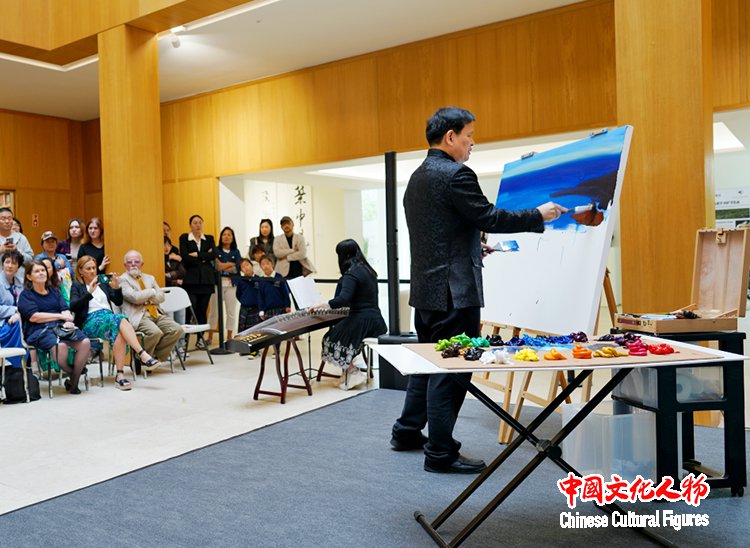
On June 11 at UCD Confucius Institute, “Tea for Harmony, Yaji Cultural Salon” witnessed its commencement under joing efforts from the Ministry of Culture and Tourism of the People’s Republic of China and the Embassy of the People’s Republic of China in Ireland. Zhou Changxin, dean of Changxin International College of Art, Yunnan University, attended the salon and demonstrated impasto oil painting skills.
Wang Baosheng, Editor-in-Chief of Chinese Cultural Figures/ Report
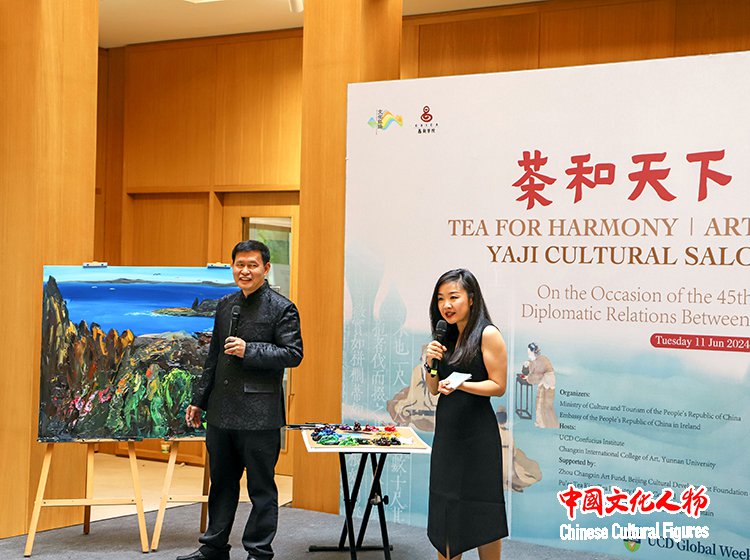
Mr. Zhou Changxin was offering interpretation of his work and shedding light on its connotation.
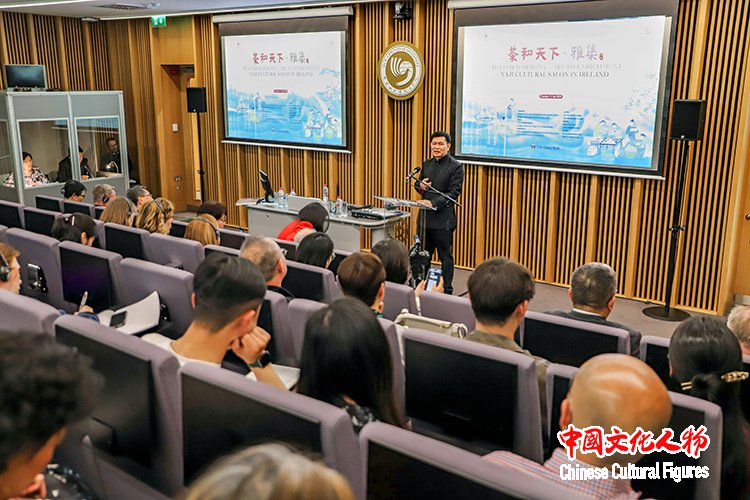
Mr. Zhou Changxin was deliver a speech titled “Tea for Harmony, Art to Enrichment” to guests from Ireland.
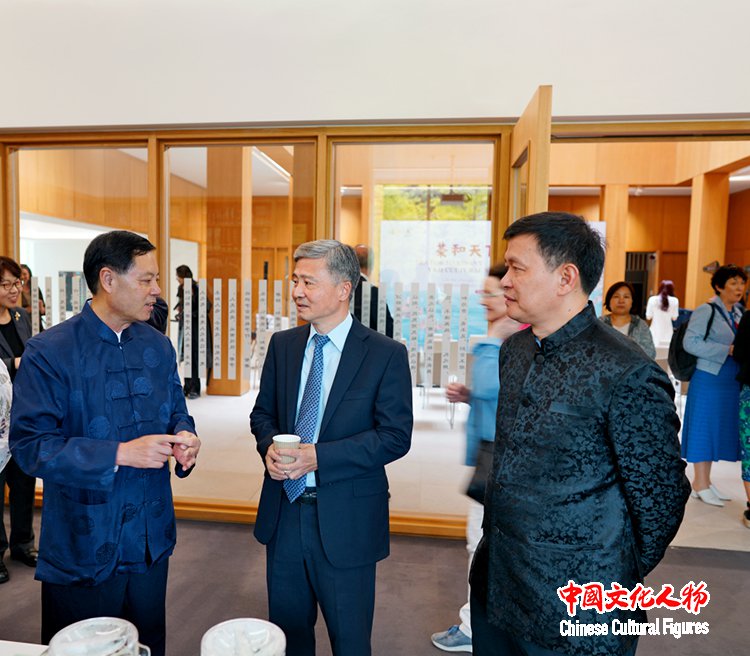
Chinese Ambassador to Ireland Mr. He Xiangdong, Mr. Zhou Changxin, and Chairperson of the King of Puer Tea Group Mr. Ji Xiang were having a discussion at the event.
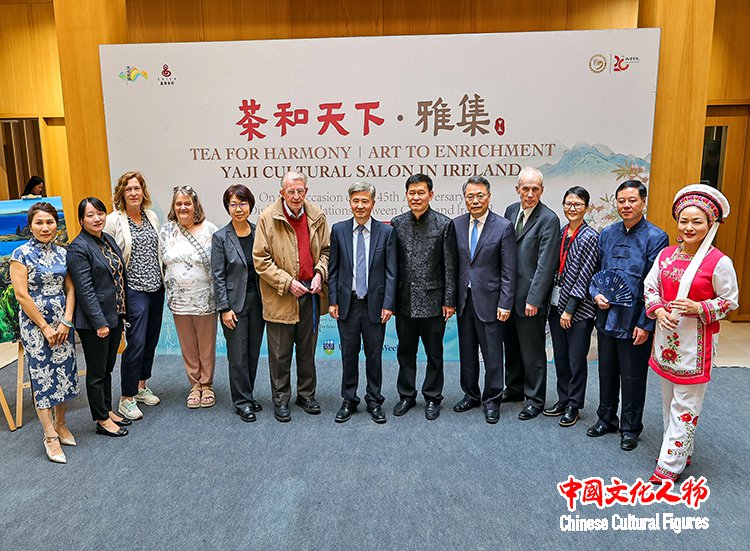
A group photo of the Chinese Ambassador to Ireland Mr. He Xiangdong, John Kennedy, Principal Officer of Cultural Schemes at the Department of Tourism, Culture, Arts, Gaeltacht, Sport and Media, Mr. Zhou Changxin, Dean of the Changxin International College of Art at Yunnan University, Mr. Ji Xiang, Chairperson of the King of Puer Tea Group, and other officials and artist guests attending the event.
Chinese Cultural Figures (Editor-in-Chief Wang Baosheng) - In order to celebrate the 45th anniversary of the establishment of diplomatic relations between China and Ireland, the Ministry of Culture and Tourism of the People’s Republic of China and the Embassy of the People’s Republic of China in Ireland, on June 11 at UCD Confucius Institute for Ireland, co-organized “Tea for Harmony, Yaji Cultural Salon”, an event co-hosted by institutions like Changxin International College of Art, Yunnan University, UCD Confucius Institute for Ireland, the Chester Beatty Library, the UCC Confucius Institute, and assisted by Zhou Changxin Art Fund of Beijing Cultural Development Foundation as well as King of Puer Tea Group. Zhou Changxin, a renowned contemporary Chinese painter, pioneer of impasto oil painting and also dean of Changxin International College of Art, Yunnan University, was a special guest in the house invited to hold a lecture on “China’s Story”.
The salon was attended by nearly 100 local and international guests, including Chinese Ambassador to Ireland Mr. He Xiangdong; John Kennedy, Principal Officer of Cultural Schemes at the Department of Tourism, Culture, Arts, Gaeltacht, Sport and Media; Aisling McDermott, Manager for Middle East & Asia from Tourism Ireland; Dr Anna Nunan, Head of Unit of UCD Centre for English and Global Languages; Clár Ní Bhuachalla, Director of Global Centre for Irish Language and Culture; John Hayes, Principal of Kildare Town Community School; Amanda Rice, Vice Principal of Kildare Town Community School; Mr. Wang Liming, Director of the UCD Confucius Institute; Mr. Xie Jiangnan, Chinese Director of the UCD Confucius Institute; Mr. Ji Xiang, Chairperson of the King of Puer Tea Group.
To showcase the unique charm of Chinese impasto oil painting to Irish people, Zhou Changxin created a vibrant Irish landscape painting with half an hour, and after which, he shed the light on the connotation of his work. The painting depicted seagulls fluttering in the distance and continuous coastal reefs in the foreground, which highlighted his extraordinary realistic modeling skills. Additionally, lush vegetation and strategically placed crimson touches embodied the Eastern spirit of “intention precedes the brush”. The poetic and picturesque depiction of Ireland by Zhou Changxin truly lived up to its title as the “Emerald Isle”. According to Zhou Changxin, that the pronunciation of Ireland resembles “I Love You” in Chinese signifies the Irish people’s love and affection spreading across the blue sky and sea, symbolizing human warmth and connection.
Local guests were deeply moved, speaking highly of Zhou Changxin’s vivid portrayal of Ireland and his ingenious and intriguing artistic fusion of Eastern and Western elements.
At the “China’s Story” lecture, Zhou Changxin, under the theme “Tea for Harmony, Art to Enrichment”, shared China’s story about tea and art with the Irish guests. The lecture covered various aspects, including the diversity of Chinese teas, tea as a lifestyle, the deep connection between tea culture and artistic philosophy, and the modern significance of tea culture from an international perspective.
It’s believed by Zhou Changxin that tea transcends material enjoyment, embodying profound philosophical contemplation. With an artist’s unique perspective, he drew infinite inspiration from nature and art, getting deep insights into the vastness and profundity of tea culture.
He asserted that “a world in a pot and a universe in a cup” vividly illustrates the cultural essence of “Tea for Harmony”, painting the harmonious coexistence of humans and nature, and the unity of tea and art with heavy colors on paper. Tea, as a green envoy, continuously flows to all corners of the world, not only becoming a bridge connecting China with the globe but also opening new chapters of friendly exchanges with people worldwide.
Zhou Changxin’s lecture resonated widely with the audience, earning enthusiastic applause.
The title of the King of Puer Tea was bestowed by Emperor Guangxu of the Qing Dynasty, with a history of over 140 years. King of Puer Tea Group, anchoring in China’s Puer, digs deep into this cultural essence, creating a unique tea culture brand. Adhering to traditional tea-making crafts while continually innovating, it allows more people to appreciate the charm of Puer tea, and helps Puer tea gain widespread recognition at home and abroad.
The “Tea for Harmony, Yaji Cultural Salon” and “China’s Story” lecture, using tea as a medium and art as a vehicle, built a bridge of friendship across borders. This event not only fully showcased the extraordinary charm of Chinese art but also allowed the Irish people to personally experience the profoundness of Chinese tea culture, deepening mutual understanding and spiritual communication between the two peoples.
Editors: Zhang Yan and Liu Sheng
Dichiarazione: Tutte le risorse degli articoli su questo sito web, salvo diversamente specificato o etichettato, sono raccolte da risorse online. Se il contenuto di questo sito web viola i diritti e gli interessi legittimi dell'autore originale, è possibi
